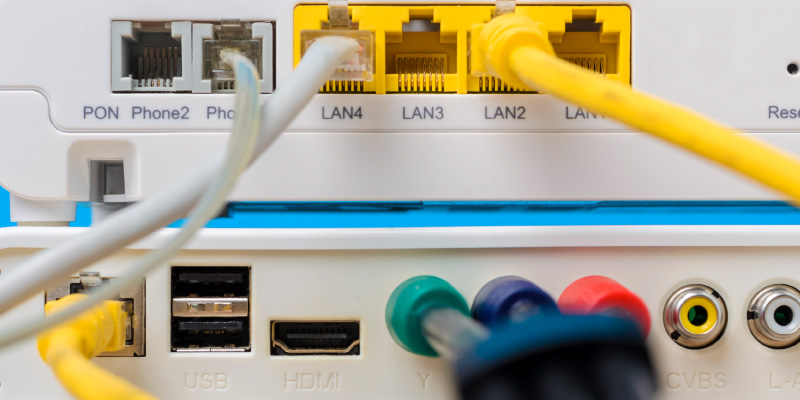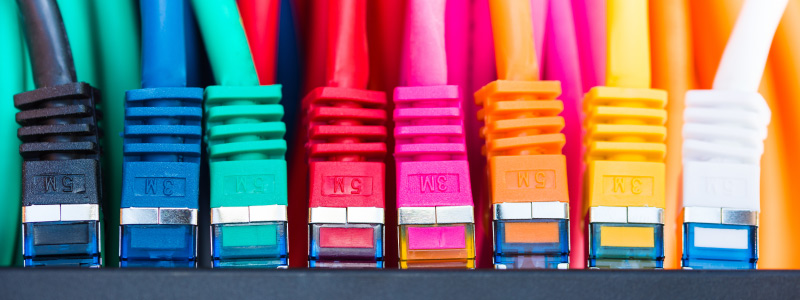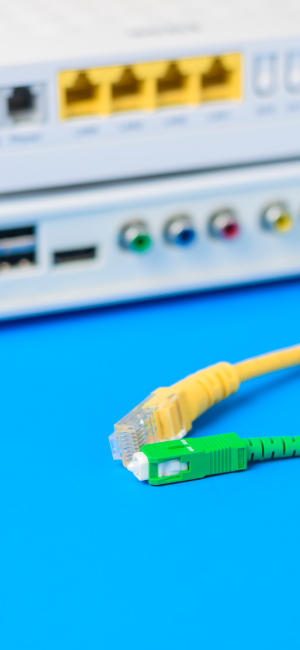Understanding DSL: how DSL works & how fast is DSL internet service?

Matthew Harrington

Both DSL and dial-up bring you internet through telephone lines. But if you're still using dial-up, it's time to upgrade to high-speed DSL. An affordable option for internet access, DLS is a popular choice for home internet.
While its connection speed doesn't compare to that of fiber or cable, DSL could still be a great option for your home.
In this article, we're taking a look at:
- What DSL is and how it works
- The average DSL internet speeds
- The different versions of DSL including asymmetric and symmetric DSL
- Which providers offer DSL plans
- How a DSL line compares to other high speed internet options
- Why DSL speeds vary
If you want to know more, keep reading!
What DSL is
DSL stands for digital subscriber line and it's a type of internet connection that uses copper telephone lines to deliver high-speed internet. Unlike dial-up, which requires a modem and a phone line, DSL uses your existing phone line but does not tie up your phone line while you are online.
How DSL works
DSL works by sending data over the existing copper telephone lines that connect homes and businesses to the local telephone exchange. Copper telephone wires have been used for decades to carry voice conversations over long distances. By using special equipment at both the user's location and the telephone exchange, DSL can send data much faster than a regular telephone connection.
Download and upload speeds: Asymmetric DSL & symmetrical DSL
Asymmetric DSL (ADSL) is a type of DSL service that provides different download and upload speeds. ADSL is typically faster for downloads than for uploads, which is why it's called "asymmetric."
Symmetrical DSL (SDSL) is a type of connection that offers the same speeds for both downloads and uploads. This is different from "asymmetrical" DSL, which is what most people have. With asym DSL, you get faster speeds for downloads than for uploads.
SDSL is less common than asym DSL, but it's becoming more popular for businesses that need to upload large files frequently.
The benefits of a DSL internet connection
DSL offers a number of advantages over other types of internet connections:
- It's much faster than a regular dial-up connection.
- It doesn't tie up your phone line, so you can use the internet and make phone calls at the same time.
- It's always on, so you don't have to wait for it to connect each time you want to go online.
The disadvantages of a DSL internet connection
DSL has a few potential drawbacks:
- The speed of your connection may vary depending on how far you live from the telephone exchange.
- If your power goes out, your DSL connection will be lost.
- You may need to pay for a professional to install DSL at your home or business.

Internet speed: How fast is DSL internet?
DSL speeds can vary depending on the type of connection you have and how far you live from the telephone exchange. However, in general, DSL speeds are much faster than a regular dial-up connection.
If you're looking for a fast and reliable internet connection, DSL is a great option. It's much faster than a regular dial-up connection and it doesn't tie up your phone line. Plus, it's always on, so you don't have to wait for it to connect each time you want to go online. Just keep in mind that the speed of your connection may vary depending on how far you live from the telephone exchange.
DSL is a great option for anyone who wants a fast and reliable internet connection. It's much faster than a regular dial-up connection, it doesn't tie up your phone line, and it's always on. Just keep in mind that DSL speeds can vary depending on your location and the type of connection you have.
DSL vs cable internet
- Speed: DSL speeds can vary depending on your location and the type of connection you have. Cable internet speeds, on the other hand, are much faster than DSL.
- Availability: DSL is available in most areas, but cable internet is only available in certain areas.
- Price: DSL plans tend to be cheaper than cable internet plans.
If you're looking for a fast and reliable internet connection, cable is a better option than DSL. However, if you're looking for a cheaper option, DSL is a good choice. Just keep in mind that the speed of your connection may vary depending on how far you live from the telephone exchange.
DSL vs wireless internet
- Speed: Wireless internet speeds are much faster than DSL.
- Availability: Wireless internet is only available in certain areas.
- Price: DSL plans tend to be cheaper than wireless internet plans.

DSL internet providers in your area
If you're looking for a DSL internet service provider in your area, there are a few things to keep in mind. First, the speed of the connection can vary depending on how far you live from the telephone exchange. Second, if your power goes out, your DSL connection will be lost. And finally, you may need to pay for a professional to install DSL at your home or business.
- Verizon: Verizon offers a variety of DSL plans, all of which come with a two-year price guarantee.
- AT&T: AT&T offers several DSL plans, including a "pay as you go" option.
- CenturyLink: CenturyLink offers both home and business DSL plans.
- Comcast: Comcast offers both home and business DSL plans.
- Time Warner Cable: Time Warner Cable offers both home and business DSL plans.
DSL vs fiber optic internet
- Speed: Fiber optic internet has high-speed internet access and offers much faster internet than DSL plans.
- Availability: Fiber optic internet is only available in certain areas.
- Price: Fiber optic plans tend to be more expensive than DSL plans.
DSL vs dial-up internet
- Speed: DSL is much faster than a regular dial-up connection.
- Availability: DSL is available in most areas, but dial-up is only available in certain areas.
- Price: DSL plans tend to be cheaper than dial-up plans.
DSL vs satellite internet
- Speed: Satellite internet speeds are much faster than DSL.
- Availability: Satellite internet is available in more areas than DSL.
- Price: Satellite plans tend to be more expensive than DSL plans.
DSL FAQs
Q: What type of connection do you need for DSL?
A: You need a phone line to connect to DSL.
Q: How fast is DSL internet?
A: The speed of your connection may vary depending on how far you live from the telephone exchange. In general, DSL speeds are much faster than a regular dial-up connection.
Q: What happens if your power goes out with DSL?
A: If your power goes out, your DSL connection will be lost.
Q: Is DSL always on?
A: Yes, DSL is always on. You don't have to wait for it to connect each time you want to go online.
Q: Do you need to pay for a professional to install DSL at your home or business?
A: Yes, you may need to pay for a professional to install DSL at your home or business.
Q: Can you get DSL without a phone line?
A: No, you need a phone line to connect to DSL.
Q: Do I need a DSL modem?
A: Yes, you need a DSL modem to connect to the internet.
Q: What are DSL's download and upload speeds?
A: DSL speeds can vary depending on your location and the type of connection you have. In general, DSL has faster download speeds than upload speeds, which is why it's called "asymmetric."
Q: Does DSL use a coaxial cable?
A: No, DSL uses a phone line.
Q: Is DSL affected by the weather?
A: Yes, bad weather can affect your DSL connection.
Q: What is the difference between DSL and broadband internet?
A: Broadband is a general term that covers any type of high-speed internet connection, including DSL, cable, and fiber optic.
Q: What is bonded DSL?
A: Bonded DSL (also called "multi-line" or "double-line" DSL) is a type of connection that uses two phone lines instead of one. This gives you twice the speed of a single-line connection.
Q: What is Naked DSL?
A: Naked DSL (also called "unbundled" or "dry loop" DSL) is a type of connection that doesn't require you to have a phone line. This can be a good option if you want high-speed internet but don't want to pay for a phone line that you don't use.
Q: What is VDSL?
A: VDSL (Very High Bit-rate Digital Subscriber Line) is a type of connection that offers speeds up to 52 Mbps. It's similar to ADSL2+, but it's faster and has a shorter range.
Q: If DSL uses my phone lines, can I still use the telephone and internet at the same time?
A: Yes, you can use the internet and phone at the same time with DSL.
Find the right internet for you: Get DSL internet with HomeLinkd
DSL technology may not offer what fiber can but for many Americans who use want a better internet connection they can rely on, it's an amazing option. Plus if you want faster DSL, there are packages and plans that offer faster DSL speeds. Either way, DSL is a great option for internet users on a budget.
In this blog post, we have looked at what benefits DSL provides as well as its drawbacks, how it compares to other internet signals and which companies provide internet plans with DSL. So if you need to use the internet for work, schooling or leisure but want to keep your costs low, use DSL!
Still interested in knowing what else is out there? We want to connect you to the internet! On our website, we publish blog posts about all the other high-speed internet options you have including cable or fiber internet plans, how to fix slow internet speeds and the speed of connection you need for activities such as gaming.
So if you want to access the internet with ease, visit our website!










